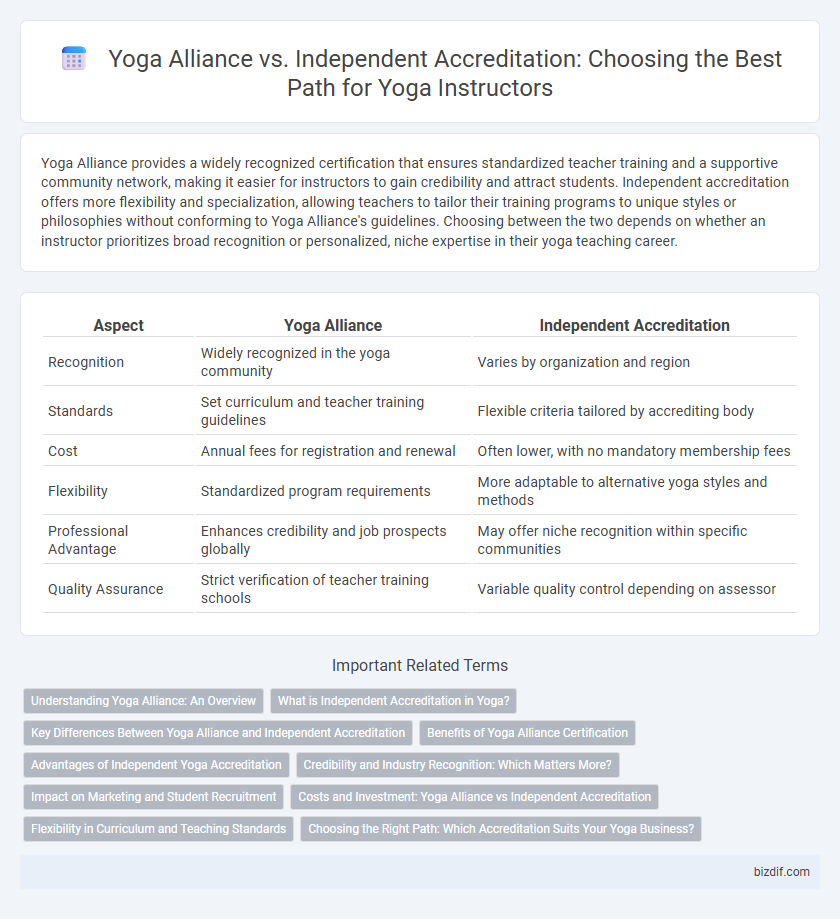Yoga Alliance provides a widely recognized certification that ensures standardized teacher training and a supportive community network, making it easier for instructors to gain credibility and attract students. Independent accreditation offers more flexibility and specialization, allowing teachers to tailor their training programs to unique styles or philosophies without conforming to Yoga Alliance's guidelines. Choosing between the two depends on whether an instructor prioritizes broad recognition or personalized, niche expertise in their yoga teaching career.
Table of Comparison
| Aspect | Yoga Alliance | Independent Accreditation |
|---|---|---|
| Recognition | Widely recognized in the yoga community | Varies by organization and region |
| Standards | Set curriculum and teacher training guidelines | Flexible criteria tailored by accrediting body |
| Cost | Annual fees for registration and renewal | Often lower, with no mandatory membership fees |
| Flexibility | Standardized program requirements | More adaptable to alternative yoga styles and methods |
| Professional Advantage | Enhances credibility and job prospects globally | May offer niche recognition within specific communities |
| Quality Assurance | Strict verification of teacher training schools | Variable quality control depending on assessor |
Understanding Yoga Alliance: An Overview
Yoga Alliance is a widely recognized organization that sets standards for yoga teacher training programs, providing a registry of certified instructors worldwide. Its accreditation offers credibility and a sense of community among teachers adhering to established guidelines, enhancing career opportunities. Independent accreditation, by contrast, may vary in criteria and recognition, often appealing to specialized or non-traditional training approaches.
What is Independent Accreditation in Yoga?
Independent accreditation in yoga refers to certification granted by organizations not affiliated with Yoga Alliance, often emphasizing specialized training standards and unique teaching methodologies. These accrediting bodies assess teacher training programs based on criteria such as curriculum depth, instructor qualifications, and adherence to specific yoga traditions, providing alternative credentials recognized within certain yoga communities. Choosing independent accreditation can offer instructors opportunities for personalized professional development and may align better with diverse student needs or niche yoga styles.
Key Differences Between Yoga Alliance and Independent Accreditation
Yoga Alliance accreditation offers standardized curriculum guidelines and a widely recognized certification that facilitates instructor credibility and student trust, whereas independent accreditation often provides more flexible, niche-focused programs tailored to specific yoga styles or teaching philosophies. Yoga Alliance requires adherence to specific training hours and ethical standards, ensuring uniform quality, while independent accreditation allows for customization of training duration and content to better match the instructor's unique approach. Choosing between the two impacts career opportunities, with Yoga Alliance being preferred by many studios and insurance providers, while independent accreditation may appeal to those seeking specialized or innovative yoga education.
Benefits of Yoga Alliance Certification
Yoga Alliance certification provides globally recognized credibility and access to a vast network of registered yoga schools and teachers, enhancing professional opportunities and client trust. It ensures adherence to standardized curricula and ethical guidelines, promoting consistent teaching quality and safety. Certified instructors benefit from continuing education resources and marketing support, which foster career growth and increased visibility in the competitive yoga industry.
Advantages of Independent Yoga Accreditation
Independent yoga accreditation offers greater flexibility in curriculum design, allowing instructors to tailor programs to diverse styles and student needs. It often enables faster certification processes and lower costs compared to Yoga Alliance standards. Independent accreditation also promotes innovation by embracing alternative teaching methodologies and evolving industry trends.
Credibility and Industry Recognition: Which Matters More?
Yoga Alliance certification provides widely recognized industry standards, enhancing credibility among studios and employers globally. Independent accreditation may offer specialized training but often lacks the universal acceptance that Yoga Alliance credentials hold. For aspiring yoga instructors, choosing Yoga Alliance-backed programs typically ensures broader professional recognition and trust within the yoga community.
Impact on Marketing and Student Recruitment
Choosing Yoga Alliance accreditation enhances credibility with potential students by aligning with a widely recognized standard, boosting enrollment through increased trust. Independent accreditation allows for unique branding and curriculum flexibility, attracting niche markets seeking specialized training. Marketing efforts for Yoga Alliance programs often emphasize global recognition, while independent schools focus on personalized storytelling and differentiators to drive student recruitment.
Costs and Investment: Yoga Alliance vs Independent Accreditation
Yoga Alliance certification typically requires annual membership fees ranging from $65 to $195, making it a recurring investment for instructors, whereas independent accreditation often involves a one-time payment or varied costs depending on the certifying body. Independent accreditation may offer more flexibility in pricing but can lack the widespread recognition and networking opportunities provided by Yoga Alliance, impacting long-term value for career growth. Evaluating costs against benefits like program credibility, student recruitment, and professional development is essential when choosing between Yoga Alliance and independent accreditation paths.
Flexibility in Curriculum and Teaching Standards
Yoga Alliance offers a standardized curriculum framework and teaching standards, providing consistency across certified programs. Independent accreditation allows instructors greater flexibility to tailor their curriculum and teaching methods to specific styles or student needs. This adaptability helps instructors innovate while still maintaining credible certification.
Choosing the Right Path: Which Accreditation Suits Your Yoga Business?
Choosing between Yoga Alliance certification and independent accreditation depends on the goals and values of your yoga business. Yoga Alliance offers widely recognized credentials that enhance credibility and network opportunities, whereas independent accreditation allows for customized standards tailored to niche or specialized teaching styles. Assessing your target market, business vision, and desired community engagement will help determine which accreditation path aligns best with your professional growth and student trust.
Yoga Alliance vs Independent Accreditation Infographic

 bizdif.com
bizdif.com